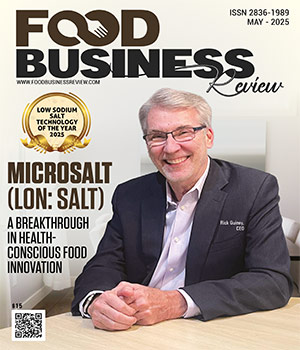As consumers and regulators push for healthier food options, reducing sodium without sacrificing flavour has become crucial for the food industry. MicroSalt (LON: SALT) has emerged as an innovative leader, offering patented microparticle technology that delivers the same salty taste as traditional salt with approximately half the sodium content. This allows brands to meet regulatory standards and satisfy shifting consumer preferences without compromising product integrity.
“We are addressing low-sodium initiatives worldwide in a way the industry has yet to leverage fully,” says Rick Guiney, CEO of MicroSalt.
 Excessive sodium consumption is closely linked to high blood pressure, heart disease, and stroke. Health organizations, including the World Health Organization and the Centers for Disease Control and Prevention, have set aggressive sodium reduction targets. Countries like the U.S., U.K., and Canada are implementing stricter guidelines, forcing food manufacturers to adapt quickly or face being left behind. At the same time, consumers are increasingly demanding healthier options that retain familiar flavours and textures.
Excessive sodium consumption is closely linked to high blood pressure, heart disease, and stroke. Health organizations, including the World Health Organization and the Centers for Disease Control and Prevention, have set aggressive sodium reduction targets. Countries like the U.S., U.K., and Canada are implementing stricter guidelines, forcing food manufacturers to adapt quickly or face being left behind. At the same time, consumers are increasingly demanding healthier options that retain familiar flavours and textures.
However, reducing sodium content in food has traditionally been a complex challenge for manufacturers. Many currently available sodium alternatives alter the taste, change the product’s consistency, or require costly reformulation processes. Despite the growing demand, these obstacles have made widespread adoption of low-sodium alternatives difficult.
MicroSalt’s breakthrough technology, however, sidesteps these challenges by using microparticles. The company dramatically enhances surface area exposure by reducing salt particles to a fraction of their standard size. This increased surface area allows food to retain the same salty flavor despite having significantly less sodium.
We are addressing low-sodium initiatives worldwide in a way the industry has yet to fully leverage
Another key challenge in sodium reduction is ensuring a consistent salty flavour without overcompensating with additional salt. Traditional sodium tends to clump and distribute unevenly, making it difficult for manufacturers to achieve uniform flavour. This inconsistency complicates efforts to reduce sodium while maintaining taste. MicroSalt’s microparticles solve this problem by adhering more effectively to food surfaces, ensuring even distribution across the product. This makes the product taste just as salty as foods with higher sodium content but with a significantly lower sodium level. The innovation also simplifies the integration process for manufacturers, as they do not have to overhaul their existing production lines or recipes. Instead, MicroSalt’s microparticles can be easily incorporated into current manufacturing processes, resulting in a more efficient, cost-effective solution for sodium reduction.
Consumer Demand for Transparency and Taste
Today’s health-conscious consumers carefully scrutinize food labels, seeking nutritious choices without artificial additives or unpleasant aftertastes common to sodium substitutes. MicroSalt provides an ideal solution: it is all-natural, non-GMO, gluten-free, and free from artificial additives, catering to the growing consumer preference for clean-label products.
In addition to its clean-label benefits, MicroSalt is a versatile ingredient that can be seamlessly incorporated into a wide range of food products without altering the flavour profile or texture. This flexibility allows manufacturers to reduce sodium content without costly recipe modifications. Furthermore, MicroSalt’s natural, additive-free composition aligns with the increasing demand for transparency in food production. As consumers become more discerning, they are seeking products with simple, recognizable ingredients, and MicroSalt’s profile perfectly meets this demand.
-
Every day, we work to save lives—often without consumers even knowing it. When someone reduces their sodium intake through a product made with our innovation, they are taking a step toward better health. That is our mission—not just selling an ingredient, but making a real difference
One area where MicroSalt can significantly impact school meal programs is sodium content, which has long been a concern. Many schools struggle to find ways to reduce sodium while still offering meals that children will enjoy. MicroSalt presents a viable solution by enabling schools to provide healthier, low-sodium meals without sacrificing flavour. Moreover, MicroSalt’s ease of integration into existing meal programs means schools will not have to invest in costly recipe modifications or new production processes, making it a practical choice for improving the nutritional quality of school meals.
Economic and Public Health Impact
 Reducing sodium intake offers substantial economic and public health advantages. Research shows that every dollar spent on sodium reduction can save $12 in healthcare costs, translating into significant savings and improved public health outcomes. Lowering sodium consumption can reduce hypertension rates, decreasing reliance on medication and hospital services.
Reducing sodium intake offers substantial economic and public health advantages. Research shows that every dollar spent on sodium reduction can save $12 in healthcare costs, translating into significant savings and improved public health outcomes. Lowering sodium consumption can reduce hypertension rates, decreasing reliance on medication and hospital services.
“Every day, we work to save lives—often without consumers even knowing it. When someone reduces their sodium intake through a product made with our innovation, they are taking a step toward better health. That is our mission—not just selling an ingredient, but making a real difference,” says Guiney.
Beyond direct health impacts, sodium reduction could reshape global food policies. Governments worldwide are increasingly prioritizing public health initiatives, with sodium reduction centralising long-term preventative healthcare strategies. MicroSalt’s scalable technology makes it easier for brands to participate in these initiatives without compromising their bottom line.
Market Validation and Industry Adoption
Strategic innovation has driven MicroSalt’s journey from concept to industry disruptor. To introduce its groundbreaking technology, the company took an unconventional approach— launching a consumer-facing product: low-sodium potato chips. This move served as a proof of concept, demonstrating that MicroSalt could deliver full flavour while significantly reducing sodium levels. The chips quickly gained traction, landing in over 1,000 stores and becoming a bestseller on Amazon. The success validated MicroSalt’s effectiveness and opened the door for broader industry adoption.
Today, MicroSalt is available both as a direct ingredient for food manufacturers and as a consumer product for home cooking. Its rapid acceptance signals a transformative shift in sodium reduction across the entire food ecosystem.
The impact of MicroSalt is already felt in key food categories, starting with snacks, where salt plays a critical role in the flavour. Brands using MicroSalt in potato chips, popcorn, nuts and pretzels maintain the same satisfying crunch and bold taste while meeting growing consumer demand for healthier options.
Baked goods are also benefiting. Many everyday staples, from bread to crackers, contain more sodium than consumers realize. By integrating MicroSalt, bakeries can reduce sodium without compromising dough structure, texture, or taste— ensuring a seamless transition to healthier alternatives.
Even seasoning blends and spice mixes are seeing a revolution. Whether it is a smoky BBQ rub, a soup seasoning packet or a ready-to-cook meal kit, MicroSalt delivers the same depth of flavour with a fraction of the sodium.
Health-Conscious Food Innovation
-8.jpg) MicroSalt’s breakthrough technology has earned industry-wide recognition, securing some of the most prestigious accolades in health-conscious food innovation. The company was recognized in 2025 by Fast Company’s list of the World’s most innovative companies, also by IFE London for Innovation in Nutritious Foods. These honours validate MicroSalt’s role as a game-changer in sodium reduction and highlight the industry’s confidence in its innovative approach.
MicroSalt’s breakthrough technology has earned industry-wide recognition, securing some of the most prestigious accolades in health-conscious food innovation. The company was recognized in 2025 by Fast Company’s list of the World’s most innovative companies, also by IFE London for Innovation in Nutritious Foods. These honours validate MicroSalt’s role as a game-changer in sodium reduction and highlight the industry’s confidence in its innovative approach.
Strategic partnerships have further fueled its momentum. Collaborations with health-focused companies have expanded MicroSalt’s presence across multiple food categories, accelerating adoption and reinforcing its influence. As more brands integrate this technology, the shift toward a healthier food industry continues to gain traction.
The Future: Flavor without Excess Sodium
MicroSalt redefines sodium reduction, giving food manufacturers a practical, scalable solution to meet evolving health demands without sacrificing flavour. As governments tighten sodium regulations and consumers become more mindful of what they eat, the need for innovative, effective alternatives has never been greater.
By offering a low-sodium alternative that preserves the taste and functionality of traditional salt, MicroSalt is setting a new industry benchmark. It enables brands to create healthier products, improves production efficiency and contributes to global public health efforts. The benefits extend to consumers, manufacturers and healthcare systems alike.
The sodium reduction revolution is already underway—and with MicroSalt leading the charge, a future where great taste and better health coexist is now within reach.
Thank you for Subscribing to Food Business Review Weekly Brief




